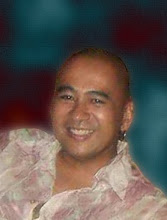Winter Health Tips from Martial Arts
Pancha Tanmantra is an ancient Indonesian healing martial art that Ratu brought to the west. The underlying Dharma of martial arts, and especially Pancha, is it is practice in meditation where instead of purely focusing on one's breath, one's awareness and mindfulness is focused on each punch, kick or block as well.
Pancha Tanmantra is a powerful method to realise the First Noble Truth, (that all of us are in suffering) by using one's direct experience of pain in one's body; it's very difficult to convince yourself that you are not suffering when standing in horse stance for 45 minutes! In the end you learn to develop a relationship with your pain like an irritating work colleague, no longer trying to avoid pain but embracing it as a fact of life and learning to deal with it.
Since Pancha is a healing art, it is rooted in Traditional Chinese Medicine Theory. We were given notes on how to heal one's body and maintain health. As a First Aider I have used many acupuncture points learned from Pancha to alleviate pain in the absence of drugs until medical help has arrived, so I know it works!
I asked my housemate, Dr Chris Eddy (TCM), if I could post some of his articles on health. Both us were students of Ratu's. I feel privileged to not only have been the recipient of his friendship and care, but to share in his knowledge from his passion for healing.
Winter in Chinese Medicine is a time for storage, when grains and produce of the previous season’s harvest were conserved for the cold months to come. As the seasons change, so too do our bodies adapt to the cold and conserve its own "grains" and energies.

Winter is a time of rest, reduced activity, introspection and staying indoors. However it is still important to keep our bodies moving to stay limber and maintain a healthy circulation. Otherwise muscles can cramp, joints become stiff and our health will suffer.
Three Tips For Staying Warm & Strong
Susceptibility to illness is increased in winter as your body struggles to generate and maintain heat to compensate for the external cold. In Chinese Medicine our Wei Qi (immunity) fights off colds and flus. Wei Qi, is classified in TCM as a warm energy that circulates on the surface of the body to protect us from the invasion of illness. Wei Qi is especially nourished from the warmth of the stomach, which is why diet is so important in winter.
Tip 1: Keep Warm: This seems obvious but I have many young patients who go out wearing as little as possible and wonder why their health suffers! Externally your back, chest and abdomen should be kept warm and covered to keep the Qi and blood circulating during the winter months.
Tip 2: Sleep: The ancient classic Chinese Medical text Nei Jing (inner cannon) advises that in winter it is better to go to sleep early and rise late when the sun’s rays have warmed the earth for optimum health.
Tip 3: Eating Well & Winter Foods: Internal warmth is also important in winter. It strengthens the function of our organs to support a healthy immune system. TCM aims to balance disharmonies. Consequently eating certain foods with the appropriate properties, according to the seasons will encourage a balanced body.
The basic properties of food are: nourishing/tonifying, hot/cold, pungent, sweet, purgative and neutral.
The cold nature of winter means raw and cold foods should be taken cautiously. It is best to eat warm cooked meals, drink warm drinks rather than cold, and alcohol in moderation can also be beneficial during the winter months.
Drinking warm water regularly may also aid to moisten the mucosa of the upper respiratory tract, making it easier to expectorate lingering phlegm if you have a cold or flu.
Best Winter Foods
Root vegetables: In winter the energy of the planet has returned to the roots of plants & the earth to regenerate. Turnips, potato, beets, carrots, burdock, daikon, sweet potato, parsnip and other root crops are great nourishing veggies for winter soups like the one below.
Herbs: Onions, scallion, garlic, and ginger root will all stimulate digestion and prevent colds. Also add mild spices like turmeric, fenugreek, fennel, coriander, cumin, white and black pepper, cinnamon, clove, and nutmeg.
Winter Warmer Recipe
1 can of red kidney beans
½ sweet potato
3 cups of water
1 onion
1-2 cloves of garlic
1 tablespoon of dark miso paste
1 carrot
100g tomato paste
Sesame oil
1 Teaspoon sea salt
1 Teaspoon diced ginger
½ Teaspoon each of cumin, coriander & fennel
1 can of red kidney beans
½ sweet potato
3 cups of water
1 onion
1-2 cloves of garlic
1 tablespoon of dark miso paste
1 carrot
100g tomato paste
Sesame oil
1 Teaspoon sea salt
1 Teaspoon diced ginger
½ Teaspoon each of cumin, coriander & fennel
General Eating Advice
Chew Your Food: Sounds simple, but don’t forget to chew to a paste. Your stomach doesn’t have teeth!
Food Portions: The Chinese have a saying, "Eat like a king in the morning, like a prince in the afternoon, and like a pauper at night".
It's also best to eat to only eat until you are 75% full; this gives the qi a chance to keep moving.
Best time: Between 7am & 11am is the best time to eat & gain maximum energy from your food. On the Chinese body clock, this is the time the spleen and stomach are most active. Eat like a king during this time!
Don’t eat too late or just before bed.
Emotion: Don’t eat while emotional. Relax and breathe when you eat. Don’t watch TV, read or talk too much whilst eating. Simply relax and enjoy your meal.






No comments:
Post a Comment